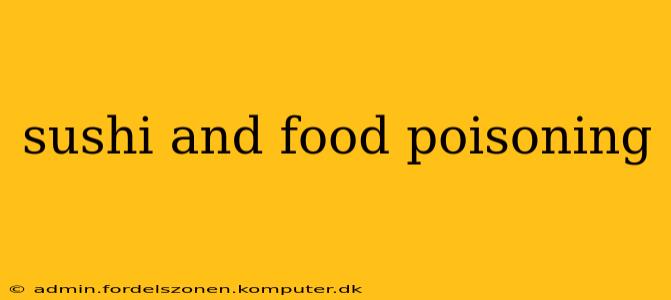Sushi, with its delicate flavors and artful presentation, has become a global culinary phenomenon. However, the raw ingredients inherent in many sushi dishes also present a risk of food poisoning if not handled correctly. This comprehensive guide explores the potential dangers, preventative measures, and symptoms to watch out for.
What are the risks of food poisoning from sushi?
The primary risk of food poisoning from sushi stems from the consumption of raw or undercooked seafood. Bacteria like Vibrio, Salmonella, Listeria, and parasites such as Anisakis can contaminate seafood, leading to illness. Improper handling, storage, and preparation significantly increase these risks. Additionally, improperly washed vegetables or contaminated rice can also contribute to foodborne illnesses.
What are the symptoms of food poisoning from sushi?
Symptoms of food poisoning after eating sushi can vary depending on the causative agent but commonly include:
- Nausea and vomiting: Often among the first symptoms to appear.
- Diarrhea: Can range from mild to severe.
- Abdominal cramps: Pain and discomfort in the stomach area.
- Fever: A sign of the body's immune response to infection.
- Headache: A general feeling of unwellness.
- Muscle aches: Generalized body pain.
In severe cases, food poisoning from sushi can lead to dehydration, requiring medical attention. If you experience severe symptoms, seek immediate medical help.
How can I prevent food poisoning from sushi?
Preventing food poisoning from sushi involves careful selection of reputable restaurants and mindful home preparation. Here are some key considerations:
- Choose reputable restaurants: Opt for establishments with high hygiene standards and a good reputation. Look for clean facilities and attentive staff.
- Check the freshness of ingredients: Observe the appearance and smell of the fish. Fresh fish should smell mildly of the sea, not fishy or ammonia-like.
- Proper handling of sushi at home: If preparing sushi at home, maintain strict hygiene practices, including thorough handwashing and the use of clean utensils. Ensure all surfaces are sanitized.
- Cook seafood thoroughly: If you are unsure about the freshness of seafood, it's best to cook it thoroughly to kill any harmful bacteria or parasites.
- Proper storage: Store sushi ingredients correctly to prevent bacterial growth. Raw fish should be kept at a consistently low temperature.
- Know your allergies: Be aware of any seafood allergies you or your guests may have and take appropriate precautions.
Is all sushi raw?
No, not all sushi is raw. Many sushi dishes incorporate cooked ingredients such as cooked fish, eggs, or vegetables. These dishes significantly reduce the risk of food poisoning compared to those containing raw fish. Understanding the different types of sushi and their ingredients is crucial for making informed choices.
Can pregnant women eat sushi?
Pregnant women should exercise extra caution when consuming sushi due to the increased risk of food poisoning and the potential harm to the developing fetus. It's generally advisable to avoid raw fish entirely during pregnancy. Opting for sushi made with cooked ingredients is a safer alternative. Consult with your doctor or midwife for personalized advice.
How long does it take for sushi food poisoning to develop?
The incubation period for food poisoning from sushi varies depending on the specific pathogen. Symptoms can appear anywhere from a few hours to several days after consumption. The shorter the time between eating sushi and experiencing symptoms, the more likely it is that the cause was foodborne bacteria.
What should I do if I think I have food poisoning from sushi?
If you suspect you have food poisoning from sushi, contact your doctor or seek medical attention, especially if you experience severe symptoms such as high fever, persistent vomiting, or bloody diarrhea. Keep yourself hydrated and avoid eating or drinking anything that could exacerbate symptoms until you feel better. This is crucial for your recovery and to prevent further complications.
This guide provides general information and does not constitute medical advice. Always consult a healthcare professional if you have concerns about food poisoning. By taking the necessary precautions and making informed choices, you can enjoy sushi safely and minimize the risk of food poisoning.
